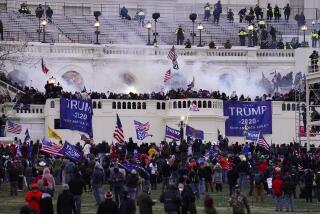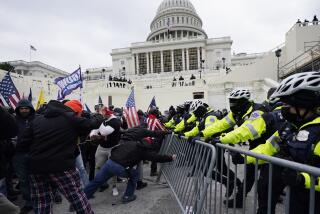AFTER THE RIOTS: THE SEARCH FOR ANSWERS : Bush Reaction to Riots Splits Republicans : Unrest: President is urged to soften approach, support serious new efforts to address the racial and social problems underlying the disorders.
- Share via
WASHINGTON — Beneath President Bush’s hard-line law and order stance toward the Los Angeles riots there is a deep-seated division within the Administration and the Republican Party over what some see as Bush’s failure to address the underlying causes of the most violent outbreak of racial unrest in this century.
Urged on by Vice President Dan Quayle, White House Chief of Staff Samuel Skinner, Atty. Gen. William Barr and others, Bush has concentrated on efforts to punish the rioters, including the decision to dispatch up to 60 federal investigators and prosecutors to help Los Angeles officials build criminal cases against those who took part in the looting and burning.
But in the White House and in Congress, other Republican voices--including White House spokesman Marlin Fitzwater, Sen. William Cohen of Maine and Civil Rights Commission Chairman Arthur Fletcher--have urged that Bush take a more moderate approach and temper his call for law and order with serious new efforts to address the racial and social problems underlying the disorders.
Failing to address these fundamental problems is bad for the country and could prove politically damaging for Bush, in this view.
The President should “not just beat up on the bad guys who did the rioting, but tell the nation we have to face up to the truth: We’ve got some real problems and have to deal with them,” one senior aide said.
“This matter is too important. It involves America’s deep national embarrassment and strikes at the heart of the country’s soul. Party doesn’t matter. It’s time to get together and do the right thing,” the aide said.
Maine’s Cohen, in a closed-door session Bush held with GOP senators in Minority Leader Bob Dole’s office, told the President that while there should be no leniency for rioters, the party of Abraham Lincoln should never allow a system to develop “that permits one rule of law for blacks and another for whites.”
Cohen was the only senator in the meeting to speak out strongly on that side of the issue, but several of his colleagues said they agreed with his remarks.
And Sens. Warren Rudman (R-N. H.) and John Danforth (R-Mo.), as well as Cohen, deplored the White House effort to blame the riot on liberal policies of the Lyndon Johnson era--an effort which drew a storm of criticism from Democrats and civil rights leaders.
In the House, Republicans who are concerned that Bush is moving too slowly are urging the White House to put together a package of proposals for the city that would seek to turn Los Angeles into a proving ground for conservative economic development ideas.
The plan, being touted by Minority Whip Newt Gingrich (R-Ga.), would begin by using Army and National Guard units now on duty in Los Angeles to help inner-city residents clean up the area and provide medical services and shelter where feasible.
These efforts would be followed by the launching of youth-oriented programs similar to the Civilian Conservation Corps of the 1930s and enactment of a package of Bush’s longstanding “empowerment” proposals, including creating “enterprise zones” to help attract business investment to impoverished areas.
Among those in the White House arguing for a more moderate approach and urging Bush to propose new efforts to help the inner cities were Judy Smith, Fitzwater’s deputy; Anna Perez, Barbara Bush’s press secretary, and Tony Snow, a deputy assistant for media relations. Smith and Perez are among the few blacks on the White House staff.
Civil Rights Commission Chairman Fletcher also deplored the effort to blame the Democratic policies and called it “playing the law and order appeal to white suburban voters for all it’s worth.” He said Bush’s ultimate response to the riots “will be a defining moment for his Administration and the Republican Party.”
Fletcher, a black Republican appointed by Bush, said “it will require heroic action like the President’s never seen to address the racial and social problems in Los Angeles and other cities. And I think the President’s political advisers are misreading the tea leaves if they think there’s no empathy for these problems in the white suburbs of this nation.”
Another prominent Republican, former New Jersey Gov. Thomas H. Kean, president of Drew University, said: “It isn’t time to be trying to assess blame. Both parties are doing it. It’s a time for reconciliation, and I’ve known George Bush for 30 years. I know he’s a man capable of calm reflection. He can bring people together, and it’s time for the President to do it.”
John D. Deardourff, a moderate Republican political consultant, called the White House response “narrow and partisan” and said, “I hope it’s not another sign they are prepared to jettison the minority vote and make another law and order appeal.”
Arrayed on the other side, in addition to Quayle, Skinner and Barr, were budget director Richard Darman and communications director David F. Demarest Jr. They argued that condemning the rioters and pledging to bring them to justice was more important than criticizing the not guilty verdicts returned in the Rodney G. King case or proposing new aid programs.
“They were concerned about maintaining conservative support for the President and making sure he was not questioning our system of justice or letting mobs have a veto over jury verdicts,” said one source.
Once Bush decided to follow the advice of the hard-liners, Fitzwater, who had led the opposition to that approach, was assigned the task of telling the press that Democratic policies were to blame for the riots.
During a confrontational news briefing that lasted an hour, the press secretary repeatedly blamed failed policies of the 1960s and 1970s, but under persistent questioning was unable to name one that had failed.
“Marlin wasn’t prepared and his heart wasn’t in it,” said one aide. “He wanted the President to show he was more understanding of the conditions that helped cause the riots. He wasn’t interested in placing the blame.”
Times staff writer Art Pine contributed to this story.
More to Read
Get the L.A. Times Politics newsletter
Deeply reported insights into legislation, politics and policy from Sacramento, Washington and beyond. In your inbox twice per week.
You may occasionally receive promotional content from the Los Angeles Times.










